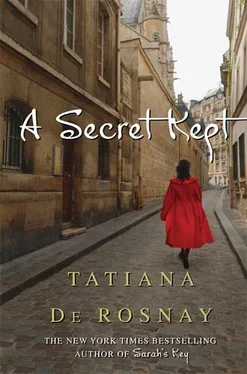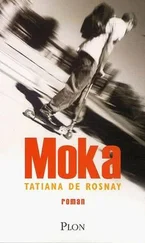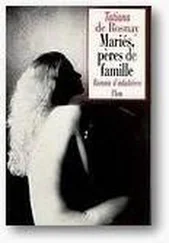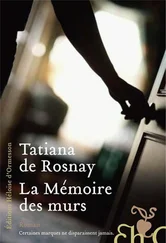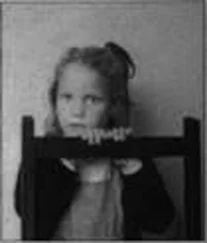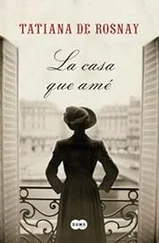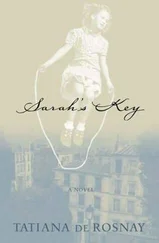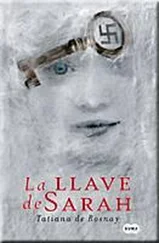I then call my father. His voice sounds feeble. Not at all like him. As usual, our conversation is brief and dispassionate. It seems my father and I are separated by a towering, hefty wall. We converse with each other, but nothing is exchanged, no tenderness, no affection. No closeness. And it has been like this all our lives. Why should it ever change? I wouldn’t even know how to begin. Ask him about his cancer? Tell him I know? Tell him I care? Impossible. He has not programmed me to do that. And as usual, like every time I hang up after talking with my father, hopelessness rears its weary head.
It is now nearly eight o’clock. Laurence Dardel is most probably at home: 50 rue Spontini. I don’t have the code to get in, and I wait outside, smoking, pacing up and down to keep warm, until a person finally walks out of the building. The list outside the concierge’s door informs me that the Fourcade-Dardel family lives on the third floor. These dignified, red-carpeted Haussmanian buildings all have the same odor, I think as I go up-savory wafts from cooking pots, beeswax polish, flowery interior fragrances.
My ring is answered by a young man in his twenties who is wearing headphones. I explain who I am and ask him if his mother is there. Before he can answer me, Laurence Dardel appears. She peers at me and says, smiling, “You’re Antoine, aren’t you? François’s son?”
She introduces me to her own son Thomas, who wanders off with his headphones, and takes me into the living room. She hasn’t changed much with the passing of time. Her face is as I remembered it, small, sharp, and pointed, her eyelashes sandy, her hair drawn back in a neat ponytail. She offers me a glass of wine, which I accept.
“I read about your grandmother’s death in the Figaro,” she says. “You must all be upset. We will of course be at the funeral.”
“I wasn’t particularly close to her,” I say.
She raises an eyebrow.
“Oh. I thought you and Mélanie doted on her.”
“Not exactly.”
There is a silence. The room we are sitting in is conventional and bourgeois. There is nothing out of place here. Not a spot on the pale gray carpet, not a speck of dust to be seen. Traditional furniture, unimaginative paintings, rows and rows of medical books. Yet this apartment could be made into a gem, I note, as my expert eye singles out ungainly false ceilings, superfluous paneling, unwieldy doors. My nose picks up a persistent cooking odor. It is dinnertime, I realize.
“How is your father?” Laurence asks politely.
She is a doctor, after all. I don’t need to pretend.
“He has cancer.”
“Yes,” she says.
“You know that, don’t you?”
“I’ve known for a while.”
“How long have you known?”
She puts a hand under her chin, purses up her mouth. “My father told me.”
I feel a slight wrench in my chest.
“But your father died in the early eighties.”
“Yes,” she says, “1982.”
She has the same stocky build as her father, the same stubby hands.
“You mean my father was already ill in 1982?”
“Yes, he was. But he pulled through with treatment. Then he was all right, I believe, for a while. Until recently.”
“Are you his doctor?”
“No, but my father was until he died.”
“He seems very tired,” I say. “Exhausted, even.”
“That’s because of the chemo,” she says. “It knocks you out.”
“Is it working?”
She looks at me levelly. “I don’t know, Antoine. I’m not his doctor.”
“Then how did you know he was ill again?”
“Because I saw him recently, and I could tell.”
So she too, like Dr. Besson, had noticed it.
“My father has not told Mélanie nor me that he is ill. His sister knows-God knows how, because they hardly speak to each other. I don’t even know what sort of cancer he has. We know nothing. He will say nothing.”
She nods but makes no comment. She finishes her glass of wine and puts it down.
“Why are you here, Antoine? Can I help you?”
Before I can answer her, the front door clicks and a burly, balding man comes in. I vaguely recognize her husband. Laurence tells him who I am.
“Antoine Rey. It’s been a while! You look more and more like your father.”
I hate it when people say that. His name comes back to me-Cyril. After a couple of minutes of small talk in which he expresses his condolences for Blanche’s death, he leaves the room. I notice Laurence glancing at her watch.
“I won’t take up too much of your time, Laurence. And yes, I do need your help.” I pause.
She looks at me expectantly. She has a vigorous, capable look that lends her a certain toughness. Almost like a man.
“I want to look at my mother’s medical file.”
“May I ask why?”
“There are a couple of things I want to check. Like her death certificate, for example.”
Her eyes narrow. “What do you need to know exactly?”
I lean forward and say with a purposeful tone, “I need to know exactly how and where my mother died.”
She seems taken aback. “Is this necessary?”
Her attitude jars me. I let it show.
“Is there a problem?”
My voice comes out a lot sharper than I had planned.
She jumps back as if I had poked her.
“There is no problem, Antoine, no reason to get angry.”
“Then can I have the file?”
“I have to look for it. I’m not quite sure where it is. It may take a while.”
“What do you mean?”
She looks at her watch again.
“My father’s files are all here, but I don’t have time to get it for you right now.”
“And when will you have the time?”
Once again, my voice has a nasty undertone that I can’t help. There is a mounting tension between us, a palpable hostility that surprises me.
“I will find it as soon as possible. I will call you when I have done so.”
“Fine,” I say, getting up hastily.
She rises too, her pointed face red. She looks up at me.
“I remember your mother’s death well. It was a terrible moment for your family. I was about twenty years old, I had just met Cyril, and I was studying to be a doctor. I remember my father calling me and telling me that Clarisse Rey had died of an aneurysm. That she was dead by the time he got to her, that there was nothing he could do.”
“I still need to look at that file,” I say firmly.
“Going back into the past never does any good. You are old enough to know that.”
I say nothing. Then I find one of my cards in my pocket. I hand it to her.
“Here is my number. Please call me as soon as you have located the file.”
I walk out as fast as I can, not saying goodbye, my cheeks burning. I close the door behind me and scuttle silently down the stairs. I don’t even wait till I’m outside to light a cigarette.
Despite the resentment, the fear of what I don’t know and don’t understand, as I run to my car in the cold darkness, I feel close to my mother, closer than I have felt in years.

The Rubis agency calls me at the end of the following day. A charming, efficient woman called Delphine. No problem giving me the file. It has been thirty-odd years after all. All she needs is for me to drop by at their bureau. She’ll check my ID and have me sign a piece of paper.
It takes me a while to get from Montparnasse to the Opéra. Trapped in heavy traffic, I listen to the radio, take deep breaths, try not to let my unease take over. I haven’t slept well for the past weeks. Sleepless nights, endless questions. Feeling dwarfed by something I cannot comprehend. I keep meaning to call my sister, tell her all I have learned, but I hold back, still. I want to know the whole story for myself. I want to have all the cards in my hand. The Rey dossier the Rubis agency is about to give me. Dr. Dardel’s medical file concerning my mother. And then it seems to me I shall know what to do and how to tell Mélanie.
Читать дальше
